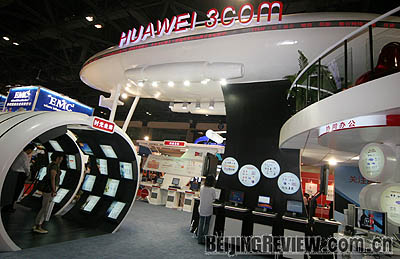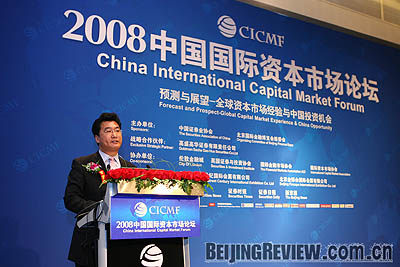|

NEW OVERSEAS STRATEGY: China's top telecom network equipment maker Huawei Technologies is considering inviting overseas strategic investors to its mobile terminal division as a route to the North American market
China's top telecom network equipment maker Huawei Technologies Co. Ltd. is said to be brewing a sale of a multibillion-dollar stake in its mobile terminal division to a foreign investor, after a collapsed $2.2 billion joint bid with private equity firm Bain Capital Partner LLC to acquire 3Com Corp. late last year.
The move has renewed domestic interest in exploring new overseas investment models. Huawei would invite strategic investors and private equity firms to make bids for a significant stake in the business in a couple of weeks, in a maneuver expected to help it foray into the North American market and be linked with U.S. service provider, according to a Wall Street Journal report on May 9.
No one within the company has confirmed the potential deal.
Chinese companies have launched overseas acquisitions quite frequently in the resource, financial and technology sectors in the past couple of years. Acquisition is a major form of China's outbound investments, accounting for about 50 percent of the total, said Andrew Delios, an associate professor with the Department of Business Policy at the National University of Singapore, in an interview with Asian Business Leaders in Beijing this March.

CAPITAL ATTRACTION: Beijing will set up an equity fund association to serve the development of venture capital and private equity funds in the capital city
"Chinese companies used to have solely owned companies offshore or have a controlling stake in the joint ventures," said Delios. "But because of business integration problems, two thirds of these acquisitions have suffered losses in the short term."
Since the Aluminum Corp. of China (Chinalco) teamed up with the U.S. aluminum producer Alcoa to buy a strategic 12-percent stake in the London-listed iron ore giant Rio Tinto this February, more and more Chinese enterprises have turned to a low-key approach in outbound investments and avoided being involved in daily operations and political concerns.
Huawei this time takes an even bigger step ahead and offers a precious opportunity for global private equity funds-the company will sell its assets to foreign investors as "a route to the U.S. market" which should "provoke far less political concern," said the Wall Street Journal report. Huawei failed in acquiring 3com because the latter provides anti-hacker and Internet security services to the U.S. government.
Diversified acquisition modes
With Chinese companies going on an overseas acquisition spree, analysts warned against risks accompanying the simplified all-cash acquisition.
Take the resource sector, for example. China has launched nearly 20 overseas acquisitions from 2002 up to now which totaled more than $30 billion and were all paid in cash, said Zeng Lingwei, CEO of China Leader Capital, a joint venture private equity firm, to China Business Post on May 30.
Stock-for-stock transaction is commonly used for stock acquisition between corporations overseas, which enables small companies to acquire a stake in a much larger one without having to make huge payments in cash to the latter, said Zeng.
This method is commonly used in domestic acquisitions, but seldom seen in overseas acquisitions.
"If we take full advantage of the transaction tool in overseas acquisitions worth up to several billion dollars, it will help Chinese companies to speed up the integration process of their overseas resources," said Zeng.
"Especially as large quantities of overseas capital have an interest in the huge benefits of China's high economic growth and the yuan appreciation, the stock-for-stock transaction will be more attractive than the all-cash deal to overseas investors and will smooth frictions during the acquisition," said Zeng.
What PE offers
Besides, more and more private equity firms will participate in China's overseas acquisitions and will ease the hostility from the target country toward acquisitions in sensitive sectors, said Zeng.
| 